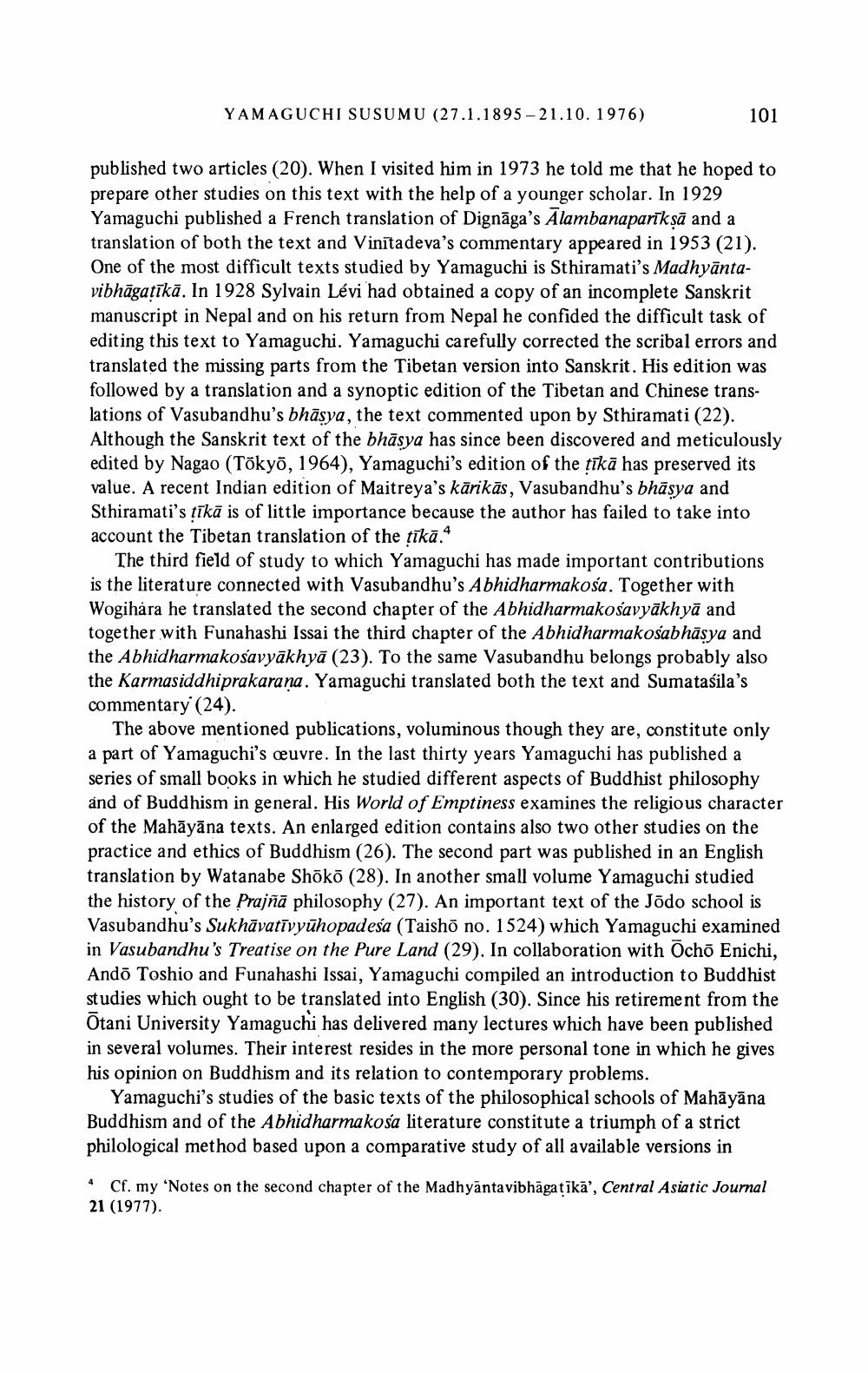Book Title: Yamaguchi Susumu Author(s): Publisher: View full book textPage 3
________________ YAMAGUCHI SUSUMU (27.1.1895 - 21.10.1976) 101 published two articles (20). When I visited him in 1973 he told me that he hoped to prepare other studies on this text with the help of a younger scholar. In 1929 Yamaguchi published a French translation of Dignaga's Alambanaparikna and a translation of both the text and Vinitadeva's commentary appeared in 1953 (21). One of the most difficult texts studied by Yamaguchi is Sthiramati's Madhyantavibhagatika. In 1928 Sylvain Levi had obtained a copy of an incomplete Sanskrit manuscript in Nepal and on his return from Nepal he confided the difficult task of editing this text to Yamaguchi. Yamaguchi carefully corrected the scribal errors and translated the missing parts from the Tibetan version into Sanskrit. His edition was followed by a translation and a synoptic edition of the Tibetan and Chinese translations of Vasubandhu's bhasya, the text commented upon by Sthiramati (22). Although the Sanskrit text of the bhasya has since been discovered and meticulously edited by Nagao (Tokyo, 1964), Yamaguchi's edition of the tika has preserved its value. A recent Indian edition of Maitreya's karikas, Vasubandhu's bhasya and Sthiramati's tika is of little importance because the author has failed to take into account the Tibetan translation of the tika." The third field of study to which Yamaguchi has made important contributions is the literature connected with Vasubandhu's Abhidharmakosa. Together with Wogihara he translated the second chapter of the Abhidharmakosavyakhya and together with Funahashi Issai the third chapter of the Abhidharmakosabhasya and the Abhidharmakosavyakhya (23). To the same Vasubandhu belongs probably also the Karmasiddhi prakarana. Yamaguchi translated both the text and Sumatasila's commentary (24). The above mentioned publications, voluminous though they are, constitute only a part of Yamaguchi's aeuvre. In the last thirty years Yamaguchi has published a series of small books in which he studied different aspects of Buddhist philosophy and of Buddhism in general. His World of Emptiness examines the religious character of the Mahayana texts. An enlarged edition contains also two other studies on the practice and ethics of Buddhism (26). The second part was published in an English translation by Watanabe Shoko (28). In another small volume Yamaguchi studied the history of the Prajna philosophy (27). An important text of the Jodo school is Vasubandhu's Sukhavativyuhopadesa (Taisho no. 1524) which Yamaguchi examined in Vasubandhu's Treatise on the Pure Land (29). In collaboration with Ocho Enichi, Ando Toshio and Funahashi Issai, Yamaguchi compiled an introduction to Buddhist studies which ought to be translated into English (30). Since his retirement from the Otani University Yamaguchi has delivered many lectures which have been published in several volumes. Their interest resides in the more personal tone in which he gives his opinion on Buddhism and its relation to contemporary problems. Yamaguchi's studies of the basic texts of the philosophical schools of Mahayana Buddhism and of the Abhidharmakosa literature constitute a triumph of a strict philological method based upon a comparative study of all available versions in 4 Cf. my 'Notes on the second chapter of the Madhyantavibhagatika', Central Asiatic Journal 21 (1977).Page Navigation
1 2 3 4 5
